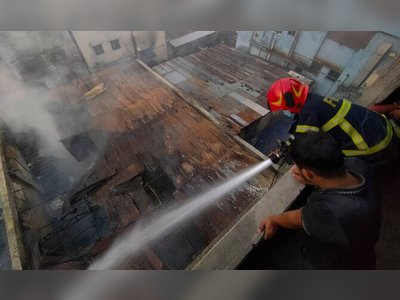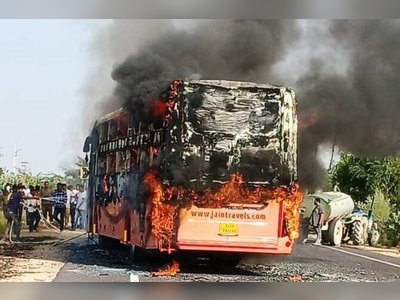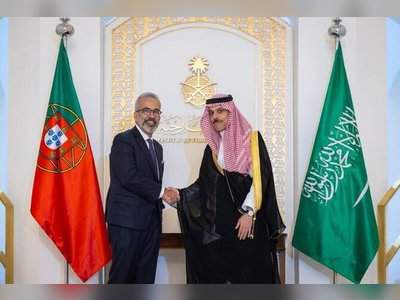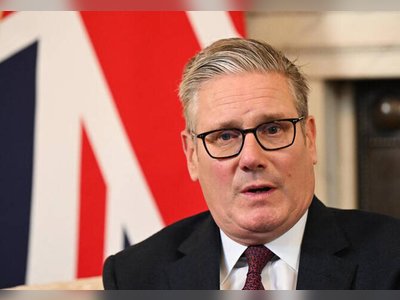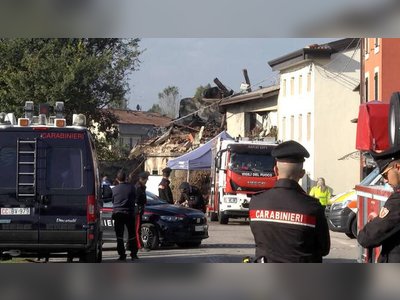
Russian Forces Target Ukrainian Hospital Ahead of Zelensky's Meeting with Trump
Kyiv's main hospital hit by Russian aerial attack, as military aid for Ukraine falls sharply.
In a dramatic escalation of hostilities, Russian forces have launched powerful glide bombs and drones against the city of Kharkiv in northeastern Ukraine.
This critical assault targeted the region's main hospital, leading to the evacuation of 50 patients and resulting in seven injuries, as confirmed by regional head Oleh Syniehubov.
The attack is part of a broader campaign aimed at disabling Ukraine’s power supply, specifically targeting energy facilities according to Ukrainian President Volodymyr Zelensky.
Zelensky emphasized on Telegram that these ongoing strikes are intended to disrupt critical infrastructure, affecting both civilians and the country's overall resilience during the harsh winter months.
In response to this heightened threat, Zelensky has called upon international partners to provide air defense systems capable of countering Russia’s long-range attacks.
He highlighted the importance of immediate support from the US, Europe, and other allies in order to safeguard Ukraine's population.
However, recent data has revealed a concerning decline in military aid to Ukraine over the past few months.
According to Germany's Kiel Institute, which tracks foreign assistance to Ukraine, military aid in July and August decreased by 43% compared to the first half of the year.
This significant reduction is attributed partly to the creation of the Prioritized Ukraine Requirements List (PURL), a fund pooling contributions from NATO members excluding the US for purchasing American weapons, munitions, and equipment.
Despite these challenges, military aid had previously exceeded levels sent between 2022 and 2024.
Zelensky is scheduled to meet with US President Donald Trump this Friday to discuss potential provisions of advanced long-range weaponry, including the possibility of supplying Tomahawk missiles.
While such a move would escalate the conflict further, it could potentially provide leverage for Zelensky to push Russia towards negotiations.
The introduction of Tomahawk cruise missiles in Ukraine’s arsenal would significantly enhance its capability to strike deep within Russian territory with precision accuracy.
These advanced weapons are anticipated to have an impact on Russian oil production and exacerbate existing gas shortages, as highlighted by Zelensky.
Despite these developments, the focus remains on securing international support for air defense systems that could counteract Russia's aerial attacks.
This critical assault targeted the region's main hospital, leading to the evacuation of 50 patients and resulting in seven injuries, as confirmed by regional head Oleh Syniehubov.
The attack is part of a broader campaign aimed at disabling Ukraine’s power supply, specifically targeting energy facilities according to Ukrainian President Volodymyr Zelensky.
Zelensky emphasized on Telegram that these ongoing strikes are intended to disrupt critical infrastructure, affecting both civilians and the country's overall resilience during the harsh winter months.
In response to this heightened threat, Zelensky has called upon international partners to provide air defense systems capable of countering Russia’s long-range attacks.
He highlighted the importance of immediate support from the US, Europe, and other allies in order to safeguard Ukraine's population.
However, recent data has revealed a concerning decline in military aid to Ukraine over the past few months.
According to Germany's Kiel Institute, which tracks foreign assistance to Ukraine, military aid in July and August decreased by 43% compared to the first half of the year.
This significant reduction is attributed partly to the creation of the Prioritized Ukraine Requirements List (PURL), a fund pooling contributions from NATO members excluding the US for purchasing American weapons, munitions, and equipment.
Despite these challenges, military aid had previously exceeded levels sent between 2022 and 2024.
Zelensky is scheduled to meet with US President Donald Trump this Friday to discuss potential provisions of advanced long-range weaponry, including the possibility of supplying Tomahawk missiles.
While such a move would escalate the conflict further, it could potentially provide leverage for Zelensky to push Russia towards negotiations.
The introduction of Tomahawk cruise missiles in Ukraine’s arsenal would significantly enhance its capability to strike deep within Russian territory with precision accuracy.
These advanced weapons are anticipated to have an impact on Russian oil production and exacerbate existing gas shortages, as highlighted by Zelensky.
Despite these developments, the focus remains on securing international support for air defense systems that could counteract Russia's aerial attacks.
